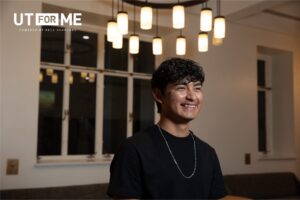AUSTIN, Texas—Famed defense attorney Johnnie L. Cochran Jr. will give the keynote speech April 19 to highlight the Sixteenth Annual Heman Sweatt Symposium on Civil Rights at The University of Texas at Austin.
The theme of the symposium is “Reparations: Does America Owe African Americans a Debt?”
Cochran’s speech, set for 7 p.m. in the LBJ Auditorium, is part of a weeklong schedule of activities that includes an art exhibition and performances by student organizations interpreting key events in African American history.
All events are free and open to the public.
Cochran is part of a legal team planning to file a court action to seek reparations for unpaid wages for forced labor and punitive damages for exploitation and oppression during slavery.
“(The lawsuit will be based) on a wide range of grounds and legal theories that apply to a number of different entities: governmental, private corporations and institutions of higher learning,” said Charles Ogletree, a Harvard Law School professor and prominent legal theorist, who is spearheading the lawsuit.
With high-profile clients such as Todd Bridges, Riddick Bowe, Michael Jackson, Sean “Puffy” Combs, Geronimo Pratt and O.J. Simpson, Cochran has firsthand experience with the facts and fallacies of the justice system in the United States. Cochran will discuss the on-going and controversial debate on whether reparations are owed to the African American community for the damaging effects of the institution of slavery.
“The debate over whether the government should apologize for slavery and offer reparations is gaining in scope and importance,” said Terry Wilson, associate vice president of The University of Texas at Austin’s Office of Community Relations and chair of the Sweatt Symposium Committee. “Students, faculty, staff and the public will have the opportunity to learn about the issues associated with the reparations movement, and to explore different options to resolve the issue of the lingering effects that slavery has had on the African American community,”
Cochran’s address about the controversial idea of reparations will examine such questions as: Why should U.S. taxpayers, who never owned slaves, pay for the sins of ancestors they don’t even know? How do you put a price tag on legalized inhumanity? In what form would reparations be paid?”
He will discuss the legal merits and precedents of reparations and outline opportunities to establish an open-ended commitment to repair the African American community by raising health, education, housing, family life and cultural life to appropriate standards.
The symposium will present an art exhibit titled “The Debt,” featuring works by Afrikan and New World Afrikan artists interpreting the concept of discrimination and social injustice. Participating artists include Christopher Adejumo, Herby Augustin, Edmond Burl, Michael Charles, David Clemmons, John Fisher, Steve Jones, Carla ‘Olonade’ Nickerson, Constance Perez, Robert Pruitt, Rejina Thomes, Nailah I. Sankofa and John Yancey.
The opening reception will be from 7 to 9 p.m., April 11, at the ”The Old School,” 1604 East 11th St. Music will be provided by the Harold McMillan Trio. At 7 p.m., April 16, the artists will host a gallery talk about the exhibit, which is on view through May 11.
Students from university student organizations will present a “Reparations Showcase” at 7 p.m., April 17, in the Art Building, Room 1.102. Featured performances will provide a chronicle and interpretation of major events in African American history.
The annual symposium is named for Heman Sweatt, who applied for admission to The University of Texas School of Law in 1946, but was denied admission on the basis of race. Sweatt, with the help of the National Association for the Advancement of Colored People, brought legal action against the university. In the landmark case, Sweat vs. Painter, the U.S. Supreme Court ruled that separate law school facilities could not provide an education equal in quality to that available at The University of Texas law school. Sweatt entered the law school in September 1950.
For more information, call the Office of Community Relations, (512) 232-4850, or see the Heman Sweatt Symposium for Civil Rights Web site for a complete list of events.



